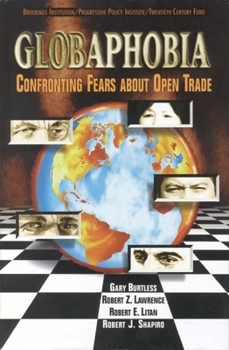Globaphobia: Confronting Fears about Open Trade
Select Format
Select Condition 
Book Overview
" A Brookings Institution Press, Progressive Policy Institute, and Twentieth Century Fund publication For much of the post-World War II period, the increasing globalization of the U.S. economy was welcomed by policymakers and by the American people. We gained the benefits of cheaper and, in some cases, better foreign-made products, while U.S. firms gained wider access to foreign markets. The increasing economic interlinkages with the rest...
Format:Paperback
Language:English
ISBN:0815711891
ISBN13:9780815711896
Release Date:February 1998
Publisher:Brookings Institution Press
Length:162 Pages
Weight:0.70 lbs.
Dimensions:0.4" x 6.0" x 8.9"
Customer Reviews
4 ratings
The Very First Book To Read on Globalization
Published by Thriftbooks.com User , 22 years ago
The ease of reading is exceptional. If you are worried about your limited understanding in economics and especially international trade, this is the book for you. In addition to the book being written and edited to be understood by nearly any modestly educated person it is further advantaged by authors that clearly understand the subject in great depth. As is so often the case the extremely well informed can write with such clarity for the lay reader.As nearly all economists understand net trade flows always equal net investment flows. Shockingly large numbers of media and congressmen do not understand this utterly simple formula. In a nut shell, with all the foreign money pouring into the USA treasuries market, stock market and direct business investments over the last several decades, it follows that the USA would run trade deficits equal to the net investment inflow over the same period. If you do not understand this or you want an ultra easy review of these simple facts, this book was made for you. In a grand gesture of national service these authors wrote the book that was needed for general understanding of what positive and negative points globalization means to the USA. It is not designed for academic kudos. If every modestly educated voter would read this book, the future of the USA and the world would be significantly brightened. While this is a pipe dream, at least read this book before you say one more word about globalization otherwise you may embarrass your self in the presence of informed people. If you are informed on economics please forgive my heavy handedness. It is not meant for you. This is a critical issue for underdeveloped nations and the mature nations, there is so much to be gained by informed voters on this subject.This book is carefully grounded in the proven principals of economics. While a reviewer or two gives an impression to the contrary, decades of reading in economics provides me the confidence to assure you that this book is profoundly well grounded. At each point where scholars may differ the authors and editors have carefully laid out its discussion. This is not a book written with a liberal or conservative bent. Modern economics encompasses a significant degree of science and mathematical logic. To view this book as otherwise, is to be illogical or unwilling to accept the most basic proven equations. Again you will not find an easier more meaningful book to read on economics.The USA economy for a variety of reasons has sharply declining need for workers without a high school education and places a continuing rising premium on post college education. Increasingly, those that can graduate from the elite institutions lead nearly a charmed life in the USA. Immigrants that are able to enter the USA with limited education are having increasing difficulty as the decades roll by. It is not clear that globalization is a meaningful factor in placing the such great educational needs on the American worker. This book he
A little gem
Published by Thriftbooks.com User , 23 years ago
Globaphobia is a great little text on the benefits of free trade. If only some of those protesting about the evils of capitalism actually took the time to educate themselves. They might then see that everyone benefits from free trade; developing countries have more jobs and developed countries higher real wages; consumers everywhere get greater choice. There will always be losers - as the book makes clear. But that's a fact of life whichever economic creed you follow. There are significantly fewer losers in Asia now that forty years of economic liberalisation have raised income levels from paddy field to first world standards. This book explains why - in crisp simple terms.
Excellent Information BUT Beware of Assumptions
Published by Thriftbooks.com User , 23 years ago
Globaphobia is an important book for anyone trying to get a handle on the free trade arguments. The book is well written and addressed to a lay audience. One should be careful about some of the assumptions in the book, especially if one has no background in economics. I was required to get the book as a supplementary reading for an International Trade Theory course. I found it to be very helpful in getting a big picture understanding of current International Trade Theory. Buy the book; it is worth the relatively inexpensive price!
Stimulating ideas on globalization and the U. S. economy.
Published by Thriftbooks.com User , 26 years ago
An effective presentation of the positive and sometimes negative effects that open world trade has on the U. S. economy. It suggests thought-provoking ideas on how the United States and other national economies can ease the negative effects of globalization on their less-educated or poorly-prepared working populations. Our consulting staff recommends this publication as "semi-relaxed" reading when you are ready to let your mind roam and consider new ideas. John R. Jagoe, Director, Export Institute






